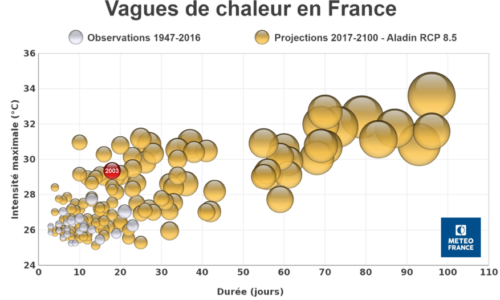Heat wave, stop being surprised, let’s invest better
June 2019, the heat wave that affects France and part of Europe takes centre stage. However, we should be less and less surprised by this type of weather event which, with climate change, is becoming more and more common. To see this, take a look at the ClimatHD portal put online by Météo France to disseminate the main climate projections in France. Trends have already been observed and if we continue on the same greenhouse gas emission trajectory, a heat wave as extreme in intensity but also in duration as the 2003 France heat wave (which remains the reference extreme) will be a normal summer in the second half of the century. Such events have health but also economic consequences amounting to billions of euros, with effects on labour productivity, agricultural production and the energy sector.
Météofrance projections

We can then ask ourselves what will be the future extreme events, those that may legitimately surprise us tomorrow. For example, some scientific studies point to new records with temperatures exceeding 50°C in several regions of France. Above all, however, we must ask ourselves what it means for cities, territories and economic activities to experience heat waves such as the one we are experiencing this summer 2019 on a much more regular basis. Some communities and organizations have taken full ownership of this issue. In France, Lyon or Paris are among the good students very often mentioned. However, despite the existence of a National Climate Change Adaptation Plan and the obligation for intermunicipalities to integrate adaptation into their Territorial Air Energy Climate Plans, these examples remain the exception rather than the rule. Far too many actors still think that we will adapt as we go along.
This is where low-will, without anticipation, there is a good chance that spontaneous behaviour is not the best answer. If we wait until the next weather alert to prepare, the risk of making sub-optimal decisions is high. Just look at the last-minute purchases of air conditioners that mark the beginning of each episode. Such individual, short-term measures are only slightly effective and generate unwanted consequences (we talk about “missadaptation”) such as very high over-consumption of energy.
Not anticipating sufficiently, it is like stopping in losing trajectories in a different climate.
More systemic responses require more time: to adapt urban planning, green streets, de-waterproofing soils, design sustainable cooling systems, develop cool public spaces, create shade, etc. The challenge is then to integrate these considerations into the planning processes but also into the organization of a number of essential essentiels : to manage water resources properly, to be able to count on well dimensioned sanitary services, possibly to reorganize working hours and travel needs, etc. While some activities can afford to adapt their decisions in a relatively agile way, others can only change over much longer periods of time. Some developments or reconversions require long-term investments (e. g. in new infrastructure or equipment), R&D, new skills and incompressible learning times. Not anticipating sufficiently means stopping in losing trajectories in a different climate. We cannot ignore the fact that adaptation would be to the detriment of certain particularly vulnerable actors.
Preparing for this radically new situation in which the summers we are about to experience do not resemble the summers of the past must be a strategic objective. It is necessary to systematically ask the question of how this new situation can be taken into account in all the development choices that are made: development decisions, the development of structuring economic sectors, investment in new equipment or new skills. The challenge is to ensure that collectively we invest in cities and territories that continue to be enjoyable for all. The contribution to resilience to a changing climate must become a central performance criterion for urban, economic development and social policies
In 2019-2020, I4CE will study the role that public financial institutions can play in adapting French territories to this type of event.
